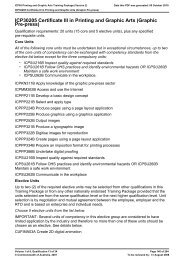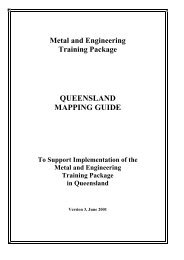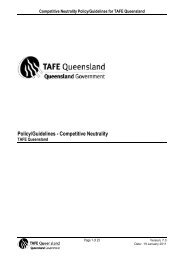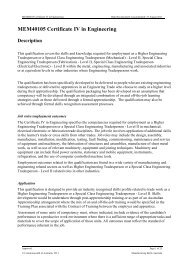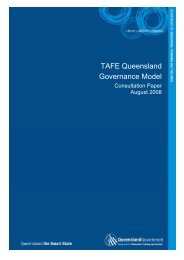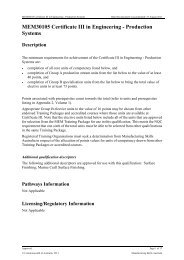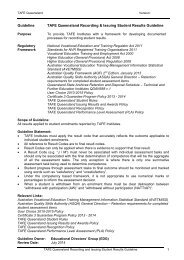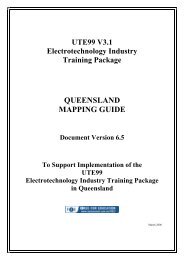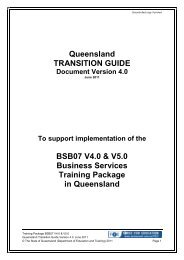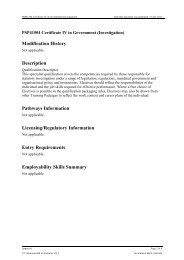Local Consultative Committee Guidelines - Training Queensland ...
Local Consultative Committee Guidelines - Training Queensland ...
Local Consultative Committee Guidelines - Training Queensland ...
- No tags were found...
You also want an ePaper? Increase the reach of your titles
YUMPU automatically turns print PDFs into web optimized ePapers that Google loves.
<strong>Local</strong> <strong>Consultative</strong> <strong>Committee</strong><strong>Guidelines</strong>Department of Education and <strong>Training</strong>(TAFE <strong>Queensland</strong>)Department of Education and <strong>Training</strong>, TAFE EducationalEmployees Certified Agreement 2009State Government Departments Certified Agreement 2009April 2011Approved at TCC Meeting 12 August 2011
TABLE OF CONTENTS1.0 BACKGROUND AND PURPOSE 32.0 CERTIFIED AGREEMENT 33.0 FUNCTIONS OF LCC 34.0 COMPOSITION 45.0 ADMINISTRATION SUPPORT 46.0 ATTENDANCE AT LCC MEETINGS 47.0 FREQUENCY OF MEETINGS 58.0 AGENDA 59.0 MINUTES 610.0 PREVENTION AND SETTLEMENT OF DISPUTES PROCEDURES 610.1 Disputes Arising out of the Certified Agreement 610.2 Programming Disputes 611.0 FURTHER INFORMATION 6APPENDIX 1 – CONSULTATIVE COMMITTEES 7Department of Education and <strong>Training</strong>, TAFE Educational Employees Certified Agreement2009 7State Government Departments Certified Agreement 2009 8APPENDIX 2 – DISPUTE RESOLUTION 9Department of Education and <strong>Training</strong>, TAFE Educational Employees Certified Agreement2009 9APPENDIX 4: PROGRAMMING GUIDELINES 10State Government Departments Certified Agreement 2009 11APPENDIX 3 – DRAFT AGENDA 12
1.0 Background and Purpose1.1 Clause 27.2 of the Department of Education and <strong>Training</strong>, TAFE Educational Employees CertifiedAgreement 2009 (Educational Agreement) requires all Institutes to establish ‘a local levelconsultative committee made up of employee and Institute representatives known as the <strong>Local</strong><strong>Consultative</strong> <strong>Committee</strong> (LCC)’. Similarly, clause 9.2 of the State Government Departments CertifiedAgreement 2009 (Core Agreement) provides that ‘at the agency level, the <strong>Consultative</strong> <strong>Committee</strong>may agree to establish standing committees, sub-committees or other additional consultativestructures (such as <strong>Local</strong> <strong>Consultative</strong> <strong>Committee</strong>s) with agreed terms of reference/operatingprinciples.1.2 The information in these <strong>Guidelines</strong> is intended to assist already established LCCs as well as assistall employees to understand the role, function and responsibilities of their LCCs.1.4 These <strong>Guidelines</strong> have been developed by the Department in consultation with unionrepresentatives. They have also been endorsed by the <strong>Training</strong> <strong>Consultative</strong> <strong>Committee</strong>, the peakconsultative body for <strong>Training</strong> <strong>Queensland</strong>.1.5 These <strong>Guidelines</strong> replace any previous guidelines issued in relation to LCCs.2.0 Certified Agreement2.1 The provisions of the Certified Agreement that are relevant to LCCs are reproduced in full atAppendix 1 and Appendix 2 to these <strong>Guidelines</strong>. Users of these <strong>Guidelines</strong> are encouraged torefer to the relevant parts of the Certified Agreement when considering any matters relating to LCCs.2.2 Where there is a conflict between the provisions of these <strong>Guidelines</strong> and the Certified Agreement,the Certified Agreement will prevail.3.0 Functions of LCC3.1 The LCC is the principal consultative body for management and union representatives within anInstitute. LCCs should operate in a spirit of participation and cooperation in order to achieve positiveoutcomes.3.2 The function and role of the LCC is to:3.2.1 Encourage and promote a cooperative partnership between the Institute and employeesthrough effective communication and consultation;3.2.2 Consult on a broad range of issues not confined to matters arising from the CertifiedAgreements;3.2.3 Identify and discuss matters in dispute in an attempt to resolve them at a local level;3.2.4 Provide a regular vehicle for the exchange of ideas, opinions and information;3.2.5 Obtain input and feedback from union representatives on issues affecting the Institute andits employees; and
3.2.6 Implement initiatives arising out of the Educational and Core Agreements in conjunction withthe <strong>Training</strong> <strong>Consultative</strong> <strong>Committee</strong>.4.0 CompositionLCCs are an employee/employer consultative forum. It is a shared responsibility of all LCC representativesto promote the role of the LCC.4.1 Unless otherwise agreed, the LCC should consist of an equal number of management and unionrepresentatives from within the Institute. For example, if there are 4 management representativesthere should be 4 union representatives (in total).4.2 Management representatives are determined by the respective Institute Director but should includethe Institute Director and Human Resource Manager to oversee and give advice where appropriate.4.3 Unions are responsible for selecting their own representatives to the LCC.4.4 Where possible, the membership of an LCC should reflect the occupational and geographic diversityof the Institute however the number of representatives may vary at each Institute.4.5 A guest, for example content expert or Union Official, may be invited to attend a meeting whereappropriate and agreed to by the LCC.4.6 The default chair of a LCC is the Institute Director however it is recommended that the role of Chairis rotated amongst union and management members.4.7 The quorum of the LCC is 50% plus 1 of management and union representatives, e.g. a minimum of2 management representatives and 2 union representatives plus one additional representative fromeither side.4.8 Decisions of an LCC should be reached by consensus rather than a voting scenario.4.9 Where there is a need for a proxy, the Institute Director should be advised in advance wherepossible.4.10 The LCC can, at its discretion, establish working parties or sub-committees to consider specificissues. Membership of these bodies is to consist of an equal number of management and unionrepresentatives and will report to the LCC.5.0 Administration Support5.1 Institute management should ensure that LCCs are provided with reasonable administrative support,materials and equipment.6.0 Attendance at LCC Meetings6.1 LCC representatives are to participate in meetings in paid work time.6.2 Where appropriate, LCC representatives may participate in meetings via video conferencing orteleconference.
6.3 Where travel is required for attendance at LCC meetings, where possible departmental vehiclesshould be provided or travel expenses will be paid by the Institute. Reasonable travel time is takento be working time.7.0 Frequency of Meetings7.1 Each Institute should determine the frequency of meetings however they must occur at least onceevery quarter.7.2 An emergency LCC meeting may be called should an issue requiring LCC consideration arise beforethe next scheduled meeting. Members are to contact the secretariat who will convene a meeting withthe approval of the Institute Director8.0 Agenda8.1 The LCC secretariat should call for agenda items at least 2 weeks before the next scheduledmeeting.8.2 All employees have an opportunity to raise an issue through any LCC representative. To facilitatethis, it may be useful for a list of LCC representatives, including contact details, be communicated toall staff at the beginning of each year and included in induction materials for new staff.8.3 The final agenda and associated material (e.g. discussion paper) will be sent to LCC representativesat least 5 working days prior to the meeting to enable LCC representatives to canvass theemployees they represent ensuring meaningful and informative discussion to occur.8.4 Institute may choose to have “Standing items” placed on agendas; an example of items is providedin Appendix 3.
Appendix 1 – <strong>Consultative</strong> <strong>Committee</strong>sDepartment of Education and <strong>Training</strong>, TAFE Educational Employees Certified Agreement 200927.0 CONSULTATIVE COMMITTEES27.1 <strong>Training</strong> <strong>Consultative</strong> <strong>Committee</strong> (TCC)27.1.1 There will be a joint consultative committee made up of employee and employer representativesknown as the <strong>Training</strong> <strong>Consultative</strong> <strong>Committee</strong> (TCC). The purpose of TCC is to oversee theimplementation of the certified agreement and operate as the peak consultative body for thedepartment’s <strong>Training</strong> Division.27.1.2 TCC will also be responsible for the resolution of matters not resolved at the local consultativecommittee level.27.1.3 The composition and functions of the TCC will be the subject of terms of reference agreed betweenthe parties and amended by agreement from time to time.27.2 <strong>Local</strong> <strong>Consultative</strong> <strong>Committee</strong>s (LCC)27.2.1 Each Institute will also have a local level consultative committee made up of employee and Instituterepresentatives known as the <strong>Local</strong> <strong>Consultative</strong> <strong>Committee</strong>s (LCC).27.2.2 The LCC may, by agreement, subsume the role/s of any other consultative forums already in place.27.2.3 The purpose of the LCC will be to consult on a broad range of local issues and is not confined to thediscussion of matters arising from this agreement.27.2.4 Matters not resolved at the LCC may be referred to the TCC for resolution, including disputespertaining to programming.27.2.5 The composition and functions of the LCC will be the subject of guidelines agreed between theparties and amended by agreement from time to time.
State Government Departments Certified Agreement 20099.2 <strong>Consultative</strong> <strong>Committee</strong>s (CC)(1) The parties agree that employees should be consulted about decisions which may affect theiremployment or welfare, and that meaningful consultation with affected employees leads to improvedorganisational outcomes.(2) In recognition of clause 9.2 (1), each agency will have a joint union/employer CC. The CC will be used tofacilitate consultation on a broad range of issues, including but not limited to discussion of mattersarising from this Agreement such as:a) Workload Management (Part 16)b) Organisational Change and Restructuring (Part 7)c) Climate Change (Part 20)d) <strong>Training</strong> (Part 3)e) Union Encouragement (Part 12)f) Balancing Work/Life and Family (Part 22)g) Organisational matters such as the review of, changes to or introduction of new workforcemanagement policies.At the agency level, the CC may agree to establish standing committees, sub-committees, or otheradditional consultative structures (such as <strong>Local</strong> <strong>Consultative</strong> <strong>Committee</strong>s or Climate Change <strong>Committee</strong>s)with agreed terms of reference/operating principles.(3) The parties recommend that in addition to CCs, agencies facilitate and encourage the operation ofconsultative forums at the local level. These forums allow for consultation, engagement and disputeresolution directly between affected employees (through their union delegates to the committee/forum)and the relevant decision-makers.(4) Each agency will develop, in consultation with the relevant unions, a framework for the conduct ofconsultation within the agency within six months of the date of certification of this Agreement. Thisframework should take into account the organisational structure of the agency, the different parties thatshould be involved in consultative processes, and the interaction between various consultativemechanisms.(5) This Agreement, through various provisions, allocates a number of roles and responsibilities to CCswhich agencies will ensure occur in accordance with the provisions of this Agreement and the Terms ofReference template for CCs. The parties to this Agreement agree to review and update the Terms ofReference template for CCs within six months of the date of certification of this Agreement.
Appendix 2 – Dispute ResolutionDepartment of Education and <strong>Training</strong>, TAFE Educational Employees Certified Agreement 200929.0 PREVENTION AND SETTLEMENT OF DISPUTES29.1 Notwithstanding the Programming Disputes Resolution Process (as outlined in clause 15Programming), the objectives of this procedure are the avoidance and resolution of any disputes overmatters covered by this Agreement, by measures based on the provision of information andexplanation, consultation, co-operation and negotiation.29.2 Subject to legislation, while the dispute procedure is being followed, normal work is to continue exceptwhere the employee has a reasonable concern about an imminent risk to the employee’s health orsafety. The status quo existing before the emergence of a dispute is to continue whilst the procedureis being followed. No party shall be prejudiced as to the final settlement by the continuation of work.29.3 There is a requirement for management to provide relevant information and explanation and consultwith the appropriate employee representatives.29.4 In the event of any disagreement between the parties as to the interpretation or implementation of thisAgreement, the following procedures shall apply:Stage 1Consideration by a sub-committee of the <strong>Local</strong> <strong>Consultative</strong> <strong>Committee</strong> (LCC) comprised of educational staffand management representatives, which may include the Institute Director, with recommendations to theteam/management within two (2) days.Stage 2If either party is not satisfied with the outcome from Stage 1, the matter may be referred by either party toboth employee representatives and officers from the Department’s Workforce Relations Unit forconsideration and action within seven (7) days.Stage 3If either party is not satisfied with the outcome from Stage 2 of this process, the matter may be referred byeither party to the <strong>Training</strong> <strong>Consultative</strong> <strong>Committee</strong> (TCC) for consideration and action within seven (7) days.29.5 If the matter is not resolved then either party may refer it to the <strong>Queensland</strong> Industrial RelationsCommission. In terms of s. 230 of the Industrial Relations Act 1999, the Commission is empowered todo all things necessary to prevent and/or settle the dispute and determine any matter in dispute.29.6 All timelines outlined above may be altered by mutual agreement between the parties.29.9 The parties acknowledge that, for matters not covered by this agreement, there are other disputeresolution procedures available.
APPENDIX 4: PROGRAMMING GUIDELINESA5.1 PROGRAMMING DISPUTE RESOLUTION PROCESSA5.1.1 Whether arising specifically from the operation of this Appendix or in relation to programming issuesgenerally, the disputes resolution process as outlined below shall be followed:Stage 1Consideration by a sub-committee of the <strong>Local</strong> <strong>Consultative</strong> <strong>Committee</strong> (LCC) comprised of educational staffand management representatives, which may include the Institute Director, with recommendations to theteam/management within two (2) days.Stage 2If either party is not satisfied with the outcome from Stage 1, the matter may be referred by either party toboth employee representatives and officers from the Department’s Workforce Relations Unit forconsideration and action within seven (7) days.Stage 3If either party is not satisfied with the outcome from Stage 2 of this process, the matter may be referred byeither party to the department’s <strong>Training</strong> <strong>Consultative</strong> <strong>Committee</strong> (TCC) for consideration and action withinseven (7) days.Stage 4If the matter is not resolved then either party may refer it to the <strong>Queensland</strong> Industrial Relations Commission(QIRC). In terms of s.230 of the Industrial Relations Act 1999, the QIRC is empowered to do all thingsnecessary to prevent and/or settle the dispute and determine any matter in dispute.A5.1.2 All timelines outlined above may be altered by mutual agreement between the parties.
Appendix 3 – DRAFT AGENDA<strong>Local</strong> <strong>Consultative</strong> <strong>Committee</strong>Date/Time:xxx of xxx 20xxxLocation:Attendees:Apologies:Secretariat:ItemNo.Agenda ItemResponsibleOfficerActionPaperCirculated1 Welcome and Apologies Chair Noting *2 Confirmation of Minutes from Previous Meeting Chair Approvaland NotingAttachment 1**3 Business Arising from Previous MinutesxxAllDiscussion4 Examples of standing agenda items• Programming parameters• Upcoming changes• Improving processes• Performance reporting• Communications• HR statistics – workforce planning• Budget – finance reports• Industry issues• Professional development• Course viabilityxx Attachment 2**5 Succinct Title Only xx To betabled**8 Other Business Chair Discussion9 Next Meeting Chair Noting





